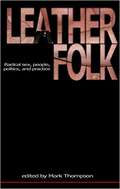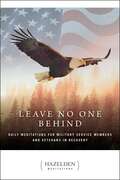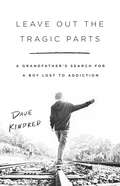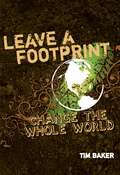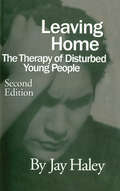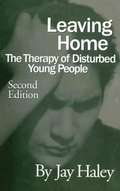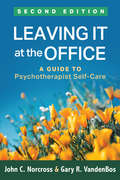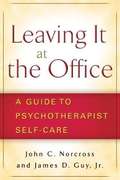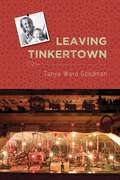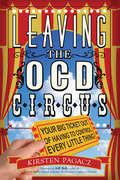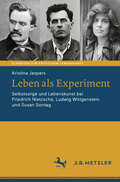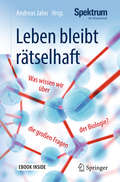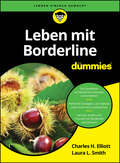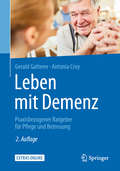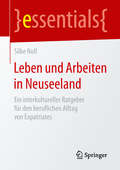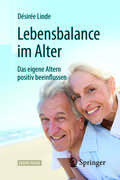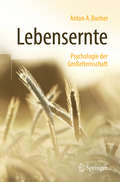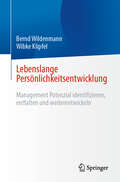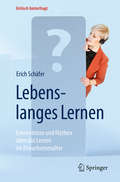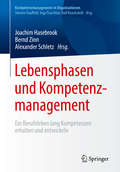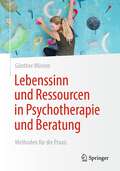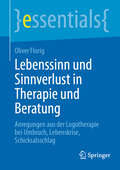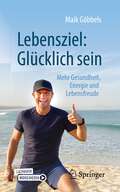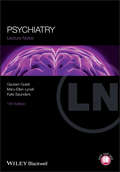- Table View
- List View
Leatherfolk: Radical Sex, People, Politics, And Practice
by Mark ThompsonSince its publication, this Lambda Literary Award-nominated book has become a classic must-read on the shelf of books addressing human sexuality and identity. Widely cited as among the most useful books of its kind, Leatherfolk is both historical witness and provocative treatise regarding a distinct subculture that has withstood decades of political harassment and other challenges to its survival. Spanning the decades from the 1940s onward, this collection of vibrant writing documents the many eras and shifts of attitude that have affected the gay and lesbian leather underground, and its influence on the society beyond.
Leave No One Behind: Daily Meditations for Military Service Members and Veterans in Recovery (Hazelden Meditations)
by AnonymousOf the Americans who serve—and have served—in the United States Armed Forces, many struggle with alcoholism and addiction. What happens when the people who keep our country safe need saving? How do we fulfill our promise to leave no one behind? We show them there are service members who have been through similar circumstances, who can help them, and who might also need help. This book does just that.In this new meditation book, service members who are in recovery share their words of healing and hope in daily meditations. These people are in a class of their own—they know what they experienced, they know how their recovery has been affected by their service, they know how to help themselves . . . and they know how to help each other. The voices in this book are unique and will resonate with readers, providing insights, thoughts, and feelings only others who have served can understand and relate to. The same can be said of recovery: we look to the person on our left and the person on our right—and we leave no one behind.
Leave Out the Tragic Parts: A Grandfather's Search for a Boy Lost to Addiction
by Dave KindredDave Kindred's extraordinary investigation of the death of his grandson yields a powerful memoir of addiction, grief, and the stories we choose to tell our families and ourselvesJared Kindred left his home and family at the age of eighteen, choosing to wander across America on freight train cars and live on the street. Addicted to alcohol most of his short life, and withholding the truth from many who loved him, he never found a way to survive.Through this ordeal, Dave Kindred's love for his grandson has never wavered.Leave Out the Tragic Parts is not merely a reflection on love and addiction and loss. It is a hard-won work of reportage, meticulously reconstructing the life Jared chose for himself--a life that rejected the comforts of civilization in favor of a chance to roam free.Kindred asks painful but important questions about the lies we tell to get along, and what binds families together or allows them to fracture. Jared's story ended in tragedy, but the act of telling it is an act of healing and redemption. This is an important book on how to love your family, from a great writer who has lived its lessons.
Leave a Footprint
by Tim BakerYou are here for a reason. God is calling you to change the world. How will you do that? Inside the pages of this book, you'll discover that God has definitely created you for a purpose, and you'll learn what that purpose is. So, dive in, explore who you are and what you're made to do-so you can change the whole world.
Leaving Home: The Therapy Of Disturbed Young People
by Jay HaleyLeaving Home presents a method of family therapy at the stage when children are leaving home. It includes a special classification of young people with problems, and tackles family orientation, the therapist support system, the first interview, apathy, troublemaking, a heroin problem, a chronic case, and resolved and unresolved issues.Visit www.haley-therapies.com for additional resources by Jay Haley, including live videos of the pioneering therapist in action.
Leaving Home: The Therapy of Disturbed Young People (2nd Edition)
by Jay HaleyLeaving Home presents a method of family therapy at the stage when children are leaving home. It includes a special classification of young people with problems, and tackles family orientation, the therapist support system, the first interview, apathy, trouble-making, a heroin problem, a chronic case, and resolved and unresolved issues. Visit www.haley-therapies.com for additional resources by Jay Haley, including live videos of the pioneering therapist in action.
Leaving It at the Office, Second Edition: A Guide to Psychotherapist Self-Care
by John C. Norcross Gary R. VandenBosMental health professionals provide better care to their clients when they care for themselves. This highly practical guide--now revised and expanded with even more self-care strategies--has helped thousands of busy psychotherapists balance their personal and professional lives. The book presents 13 research-informed self-care strategies and offers concrete methods for integrating them into daily life. Featuring examples and insights from master therapists, every chapter concludes with a self-care checklist. Infused with a positive message of self-renewal and growth, the book shows clinicians how to leave distress at the office and tend actively to their physical, emotional, and spiritual needs. New to This Edition *Chapter on mindfulness and self-compassion. *Increased emphasis on simple, real-time self-care activities. *New examples from additional master therapists and hundreds of workshop participants. *Up-to-date research findings on therapist stress and resilience. *Discussions of competence constellations, building on self-care strengths, moral stress, deliberate practice, presession preparation, journaling, and multiculturalism.
Leaving It at the Office: A Guide to Psychotherapist Self-Care
by James D. Guy John C. Norcross Jr.Wise, warm, and authoritative, this straight-talking guide addresses the realworld struggles that psychotherapists face in balancing their professional and personal lives. It demonstrates that recognizing and tending to your physical, emotional, ans spiritual needs not only feels good--it also leads to more effective and ethical practice as a clinician. The book describes and illustrates 12 self-care strategies that are grounded in the authors extensive research and clinical experience. Interwoven throughout are insights and recommendations from other master therapists, "self-care checklists" and suggestions for further reading. The lively and engaging tone will enhance the books appeal for a wide range of mental health professionals and students.
Leaving Tinkertown (Literature and Medicine Series)
by Tanya Ward GoodmanWhen Tanya Ward Goodman came home to New Mexico to visit her dad at the end of 1996, he was fifty-five years old and just beginning to show symptoms of the Alzheimer&’s disease that would kill him six years later. Early onset dementia is a shock and a challenge to every family, but the Wards were not an ordinary family. Ross Ward was an eccentric artist and collector whose unique museum, Tinkertown, brought visitors from all over the world to the Sandia Mountains outside Albuquerque. In this book Tanya tells Ross&’s story and her own, sharing the tragedy and the unexpected comedy of caring for this funny, stubborn man who remained a talented artist even as he changed before his family&’s eyes.
Leaving the OCD Circus: Your Big Ticket Out of Having to Control Every Little Thing
by Kirsten PagaczBattle OCD With Insight and InspirationBoth a book and a heart-stopping memoir that provides anxiety relief and gives comfort to those struggling to better understand themselves and their mental health.The tapping and counting and cleaning and ordering brought her comfort and structure, two things lacking in Kirsten Pagacz’s family life. But it never lasted. The loathsome self-talk only intensified, and the rituals she had to perform got more bizarre. By high school, she was anorexic and a substance abuser-common "shadow syndromes" of OCD. By adulthood, she could barely hide her problems and held onto jobs and friends through sheer grit. Help finally came in the form of a miraculously well-timed public service announcement on NPR about OCD-at last, her illness had an identity."It's like the meanest, wildest monkey running around my head, constantly looking for ways to bite me." That was how Kirsten Pagacz described her OCD to her therapist on their first session when she was well into her 30s-she'd been following orders from this mean taskmaster for 20 years, without understanding why. After finally having the answer and learning how to conquer her OCD, Pagacz wants to share her knowledge and insight with you in hopes that you join her in leaving the OCD circus and living a better life.Leaving the OCD Circus reveals the story of Pagacz's traumatic childhood and the escalation of her disorder. Learn how OCD works to misshape a life from a very young age and the various tools she used to deal with and heal her anxiety.Gain insight into:The benefits of meditation and yogaCognitive behavioral therapyMedicationExposure therapyIf you learned from guides like Anxious for Nothing, The Dialectical Behavior Therapy Skills Workbook, or The Anxiety and Worry Workbook then you’ll want to read Leaving the OCD Circus.
Leben als Experiment: Selbstsorge und Lebenskunst bei Friedrich Nietzsche, Ludwig Wittgenstein und Susan Sontag (Schriften zur Kritischen Lebenskunst)
by Kristina JaspersFriedrich Nietzsche, Ludwig Wittgenstein und Susan Sontag beschäftigten sich intensiv mit Fragen der Selbstsorge und Lebenskunst – teils im direkten Bezug aufeinander. So sah Wittgenstein in Nietzsche ein Vorbild in Fragen der Stilistik und Introspektion; Sontag wollte Wittgenstein in der Konsequenz seiner Lebensentscheidungen folgen und Nietzsche in seinem Selbstbewusstsein sowie in seiner radikalen Selbstkritik. Diese Arbeit untersucht drei Experimentierfelder, auf denen Nietzsche, Wittgenstein und Sontag sich erprobt haben und macht diese für heute fruchtbar: Ortswechsel dienen der Veränderung des äußeren Umfelds, der Suche nach neuen Anregungen oder dem Rückzug in eine ihnen gemäße Umgebung. Die Beschäftigung mit Gesundheit und Krankheit betrifft ihre psychische wie physische Verfasstheit und schließt mentale Übungen ein. In der künstlerischen Praxis suchen alle drei neue Erfahrungen, ein anderes Selbsterleben sowie Ausdrucksmöglichkeiten jenseits der Sprache.
Leben bleibt rätselhaft: Was wissen wir über die großen Fragen der Biologie?
by Andreas JahnDie ungeklärten Mysterien der BiologieWoher kommt das Leben? Warum schlafen wir? Wie können wir länger leben? Drei von sechs grundlegenden Fragen, die immer noch weitgehend offen sind und mit denen sich die moderne Biologie beschäftigt. Zu den ungelösten Mysterien zählen außerdem Evolution, Vererbung und Bewusstsein. Wie namhafte Wissenschaftler aus aller Welt versuchen, der Natur diese Geheimnisse Stück für Stück zu entlocken, beschreibt dieses Buch anhand ausgewählter Artikel aus den Zeitschriften "Spektrum der Wissenschaft" und "Gehirn&Geist". Meist sind es die Forscher selbst, die aus erster Hand ihre Beobachtungen und Entdeckungen schildern und somit Gelegenheit geben, ihnen über die Schulter zu schauen. Dabei sind sie sich längst nicht in allen Punkten einig. Der vorliegende Sammelband spiegelt den aktuellen Wissensstand, aber auch die zum Teil kontroversen Ansichten über die Wunder des Lebens wider.
Leben mit Borderline für Dummies (Für Dummies)
by Laura L. Smith Charles H. ElliottDamit Sie den Sturm in Ihrem Kopf besänftigen Borderline ist eine Persönlichkeitsstörung, die das Leben der Betroffenen und ihrer Angehörigen massiv beeinträchtigen kann. Betroffene leiden häufig unter Impulsivität, gestörter Selbstwahrnehmung und raschen Stimmungsschwankungen oder sie haben Schwierigkeiten, stabile Beziehungen zu führen. Das Buch hilft Betroffenen und Angehörigen dabei, Symptome richtig zu deuten, liefert Techniken, um zerstörerisches Verhalten unter Kontrolle zu bekommen, erläutert moderne Therapieformen und zeigt Wege auf, um langfristig ein normales Leben führen zu können. Sie erfahren Worin die Ursachen von Borderline liegen können Wie Sie Ihre Emotionen verstehen und managen Welche Therapien Ihnen weiterhelfen Wie Sie mit hilfreichen Verhaltensmaßnahmen Ihre Gesundheit verbessern
Leben mit Demenz: Praxisbezogener Ratgeber für Pflege und Betreuung
by Gerald Gatterer Antonia CroyDie demographische Entwicklung prophezeit uns: Wir werden alle älter. Die hinzugewonnene Lebenszeit kann aber oft ein Leben mit Krankheit, Behinderung und der Pflegeabhängigkeit von anderen Menschen sein. Das Buch zeigt das Leben mit einer dementiellen Erkrankung und dient als praxisorientierter Leitfaden für das Zusammenleben mit von Demenz betroffenen Personen. Klar und verständlich werden die Ursachen der Erkrankung sowie Möglichkeiten für Diagnostik und Therapie besprochen. Fachleute aus den Bereichen Medizin, Pflege, Psychologie und Angehörigenbetreuung geben praxisrelevante Lösungen, für die im Verlauf der Erkrankung auftretenden Probleme, vom Erkennen der ersten Symptome bis hin zum Abschiednehmen. Die zweite Auflage wurde komplett aktualisiert und überarbeitet, ergänzt wurden Kapitel zur Demenz aus der Sicht der Betroffenen sowie zur Sexualität im Alter. Professionelle Helfer der Altenpflege sowie Betroffene und deren Angehörige erhalten einen detaillierten Überblick zur Betreuung und Versorgung von dementiell erkrankten Menschen.
Leben mit Herzerkrankungen: Wenn Die Seele Mitleidet
by Michael StimpelDieses Buch möchte helfen, Patienten, deren Angehörigen und allen Interessierten die komplexen Zusammenhänge zwischen Herz und Seelenleben verständlich zu machen. Im Sinne der noch neuen Disziplin Psychokardiologie motiviert es, sich mit belastenden Gefühlen bei vermuteter oder nach diagnostizierter Herzerkrankung nahestehenden Menschen gegenüber zu „öffnen“ und Eigeninitiative zu ergreifen, um das Geschehene psychisch zu bewältigen, neue Lebensqualität zu gewinnen und die Herzerkrankung günstig zu beeinflussen. Und wenn das alleine nicht gelingt? Der Autor zeigt auf, bei welchen Beschwerden professionelle Beratung und psychologische Unterstützung durch Hausarzt, Kardiologen oder psychokardiologisch geschulte Psychotherapeuten notwendig sind.Aus dem Inhalt: Warum Psychokardiologie? – Verstehen: das Herz-Kreislauf-System, seine Erkrankungen und wie Herz und Seele sich wechselseitig beeinflussen – Vorbeugen und bewältigen: Selbsthilfe bei Herzerkrankung und seelischem Tief – Erkennen: wann eine psychische Erkrankung vorliegt – Behandeln: wer und was hilft – Herausgefordert: der Lebenspartner.Der Autor: Prof. Dr. med. Michael Stimpel ist ärztlicher Psychotherapeut, Professor für Innere Medizin (Universität zu Köln) und Dozent am Saarländischen Institut zur Aus- und Weiterbildung in Psychotherapie (SIAP). Lange als Ärztlicher Direktor und Chefarzt an verschiedenen Akut- und Rehakliniken tätig, arbeitet er als Psychokardiologe, Coach und Gesundheitstrainer in eigener Praxis in Düsseldorf.
Leben und Arbeiten in Neuseeland: Ein interkultureller Ratgeber für den beruflichen Alltag von Expatriates (essentials)
by Silke NollDieses essential beschreibt Schritt für Schritt Jobsuche, Berufseinstieg, beruflichen Alltag und angrenzende Privatbereiche in Neuseeland und damit verbundene potenzielle Stolpersteine bei der interkulturellen Kommunikation. Das Buch geht sowohl auf oberflächlich Offensichtliches ein, als auch auf subtilere Wahrnehmungen, die durch die interkulturelle Theorie erklärt werden. Der Leser erhält auf diese Weise ein tieferes Verständnis der neuseeländischen Kultur mit ihren Werten und ungeschriebenen Regeln und Gesetzen. Und damit eine Chance, den Einstieg in dem Land am anderen Ende der Welt noch erfolgreicher zu gestalten.
Lebensbalance im Alter
by Stephan Meyer Désirée LindeDieses Buch hilft Ihnen bei der Vorbereitung und erfolgreichen Gestaltung des Ruhestands. Ausgehend von der Erarbeitung eines eigenen, positiven Altersselbstbildes erhalten Sie als Leser eine Anleitung, wie Sie durch neue Selbsterkenntnisse und einen fürsorglicheren Umgang mit sich selbst ein erfülltes und glücklicheres Altern erleben. Auch dient es zur Prävention von Altersschwermut.In diesem praxisrelevanten Ratgeber erfahren Sie alles Wichtige für die praktische Umsetzung von Wissen zum Verhalten. Dabei geht es um folgende Lebensbereiche: Körper und Geist, soziale Beziehungen, Arbeit und Freizeit, sowie Freude und Sinn des Lebens, auch für Kranke.Um die individuellen Möglichkeiten, gute Vorsätze und Absichten Wirklichkeit werden zu lassen, bietet jedes Kapitel Raum zur eigenen Reflexion. Außerdem schließt das Buch den Umgang mit Trauer und die Vorbereitung des eigenen irdischen Lebensendes mit ein.Die Themen des Buches sind von besonderer Bedeutung für Menschen, die sich aktiv auf ihren Ruhestand vorbereiten wollen, sowie für solche, die bereits im Ruhestand sind und ihre Möglichkeiten überdenken und ihre Verhaltenskompetenz erweitern möchten. Es möchte dem Leser helfen, am eigenen Selbstbild zu arbeiten und die vorhandenen individuellen Möglichkeiten auszuschöpfen. Das Buch ist auch für diejenigen geeignet, die mit alten Menschen arbeiten. Der Text erfordert keine Fachkenntnisse und ist durch viele authentische Beispiele leicht lesbar.
Lebensernte: Psychologie der Großelternschaft
by Anton A. BucherIn diesem Buch können sich alle, die in ihre Enkel vernarrt sind, informieren, warum sie damit sehr richtig liegen. Ein Streifzug durch Geschichte und Literatur wird fundiert durch Aspekte der Familienforschung und die soziologische Betrachtung einer neuen Rolle der Großeltern. Heute haben Großeltern nicht mehr nur eine Funktion für die Kleinen, sondern begleiten über die Lebensspanne. In einer Zeit, in der man den Eindruck bekommt, jeder Zweite würde das Alter als Last empfinden oder jeder Vierte lebe in Zwist und Trennung, lädt der Autor ein, die Etappe als Oma und Opa als Ressource für ein gelungenes Leben zwischen Individuation und Bezogenheit zu entdecken – für sich selbst wie für die Enkel. Die Sicht der Enkel rundet das Lesebuch ab. Aus dem Inhalt: Großeltern in Literatur und Geschichte – Nicht nur Märchen erzählen, sondern joggen gehen – Ernte der Beziehung – Die Sicht der Enkel. Über den Autor: Prof. Dr. Anton A. Bucher widmet sich neben seinen universitären Studien gern psychologischen Aspekten des guten Lebens und ist Autor mehrerer erfolgreicher Bücher.
Lebenslange Persönlichkeitsentwicklung: Management Potenzial identifizieren, entfalten und weiterentwickeln
by Bernd Wildenmann Wibke KlipfelDieses Buch unterstützt Sie dabei, den eigenen Stand der Persönlichkeitsreifung zu ermitteln und weiterzuentwickeln. Dies wird Ihnen auch in der Führung und Begleitung anderer Menschen weiterhelfen. Aus der Erkenntnis der lebenslangen Entwicklung der Persönlichkeit, ergeben sich im Laufe des Lebens in den verschiedenen Reifungsstufen viele Möglichkeiten der Entfaltung. Das Buch zeigt auf, dass zwar nicht alles zu jedem Zeitpunkt, aber zu jedem Zeitpunkt etwas entwickelbar ist. Anhand eines leicht verständlich dargestellten Modells erfahren Sie, welche Reifestufen wir Menschen erreichen können und welche persönlichen Entwicklungen über das Leben hinweg möglich sind. Dabei wird das übliche horizontale Einschätzungsverfahren mit Kompetenzen, Haltungen, Motiven und Emotionen durch eine vertikale, neue und spannende Perspektive ergänzt. Sie erhalten Entwicklungstipps für die unterschiedlichen Entwicklungsstufen und Entwicklungsfelder. Die Autoren vermitteln dabei positive Entwicklungsmöglichkeiten in nahezu allen Feldern und regen damit einen Paradigmenwechsel der Persönlichkeitsbetrachtung an.
Lebenslanges Lernen
by Erich SchäferIn diesem Buch finden Sie Antworten darauf, wie Sie als Erwachsener gut, erfolgreich und mit Freude lebendig und nachhaltig lernen können. Sie erfahren, welche Mythen über das Lernen im Erwachsenenalter existieren und welche Lerntechniken und -tools für Sie hilfreich sein können. Dieses Werk zeigt Ihnen, wie Sie sich einen Überblick über den Markt der Weiterbildungsangebote verschaffen und anhand welcher Kriterien Sie deren Qualität beurteilen können. Es werden Wege beschrieben, wie Sie In-Beziehung-gehen zu sich, dem Lerngegenstand und dem Kontext und was Sie über Lernsettings- und Lernarrangements wissen sollten. Die neuesten Erkenntnisse der Neurobiologie und Lernpsychologie zeigen, dass Lernen keine Frage des Alters ist, sondern der eigenen Begeisterungsfähigkeit. Lebenslang zu lernen ist nicht nur möglich, sondern es kann uns auch gesünder, glücklicher und selbstbewusster machen. Das Buch bietet einen Leitfaden durch den Dschungel der eigenen Weiterbildung und hilft allen Weiterbildungsinteressierten sowohl im Vorfeld, während als auch am Ende der eigenen Fort- und Weiterbildung, den eigenen Lernprozess kritisch zu begleiten.
Lebensphasen und Kompetenzmanagement
by Joachim Hasebrook Bernd Zinn Alexander SchletzKompetenzen älterer Mitarbeiterinnen und Mitarbeiter werden im Betrieb gehalten, jüngere Mitarbeiter profitieren von den Erfahrungen älterer, Familiengründung, finanzielle Absicherung und berufliche Karriere werden für beide Elternteile unter einen Hut gebracht: Dies alles und mehr sind Aufgaben einer an Lebensphasen und -ereignissen ausgerichteten Kompetenzentwicklung, um die es in diesem Band gehen soll. Dieses Buch vermittelt fundiert und praxisnah, wie sich organisationales Kompetenzmanagement in Zeiten des demografischen Wandels an Lebensphasen und -ereignissen orientieren kann.
Lebenssinn und Ressourcen in Psychotherapie und Beratung: Methoden für die Praxis
by Günther WüstenWas ist mein persönlicher Sinn im Leben? Und wie kann dieser Lebenssinn für meine Lebensgestaltung wichtig werden? Habe ich überhaupt Zeit dafür? Oder wie kann ich handeln, dass ich Zeit habe für den Sinn des Lebens?Dieses Buch für Psychotherapeut*innen, Berater*innen und Coaches stellt den persönlichen Lebenssinn als ergänzendes zentrales Element der psychotherapeutischen Arbeit und psychologischen Beratung dar, welches direkte Implikationen und positive Effekte auf die Arbeit mit Ressourcen, Motivation und Zielen hat.Psychologische und therapeutische Modelle im Kontext Lebenssinn und Therapiearbeit werden vorgestellt; ein ausführlicher Methodenkoffer verdeutlicht praxisnah die Arbeit mit Ressourcen unter Einbeziehung des Lebenssinns im therapeutischen und Beratungskontext. Abgerundet wird das Buch durch ein Kapitel, welches zeigt, wie sich persönliche, sinnstiftende Projekte ableiten und umsetzen lassen. Einige Beispiele dafür werden vorgestellt.
Lebenssinn und Sinnverlust in Therapie und Beratung: Anregungen aus der Logotherapie bei Umbruch, Lebenskrise, Schicksalsschlag (essentials)
by Oliver FlorigDieses essential zeigt, warum es wichtig ist, Sinn im Leben zu finden. Therapeuten und Berater erhalten konkrete Ideen, wie sie Menschen auf der Suche nach einem Lebenssinn unterstützen können. Ein besonderes Gewicht liegt auf der Beratung von Klienten oder Patienten, die sich mit einer Existenzkrise oder einem einschneidenden Lebensereignis konfrontiert sehen. Auch der Umgang mit der Sinnfrage in der Begleitung von Menschen, die dem Tod entgegen gehen, wird in diesem essential thematisiert. Therapeuten erhalten Anregungen, wie die Arbeit mit Patienten, die unter einer Depression oder einer Sucht leiden, von Prozessen der Sinnfindung profitieren kann.
Lebensziel: Mehr Gesundheit, Energie und Lebensfreude
by Maik GöbbelsViele fundierte Impulse für Ihr persönliches Glück – trainieren Sie Ihre Körperchemie auf gute Energie! Der erfahrene Sport- und Mentaltrainer Maik Göbbels erklärt, welche individuellen Anreize aus Ernährung, Bewegung und sozialem Umfeld das persönliche Muster eines Menschen für Gesundheit, Zufriedenheit und Erfolg triggern. Verständnisvoll und motivierend erhält der Leser konkrete Hinweise auf den eigenen Status quo und erfährt, wie er dank der Kraftwerke im eigenen Körper, der Mitochondrien, neue Energien gewinnt, die eigene Kraft (wieder) fokussiert, lohnende Änderungen wagt, Resilienz aufbaut und vor allem seine volle Lebensfreude wiederfindet.
Lecture Notes: Psychiatry
by Gautam Gulati Mary-Ellen Lynall Kate E. SaundersLecture Notes: Psychiatry provides a concise and accessible introduction to the fundamentals of Psychiatry, presenting the principles of Psychiatric examination followed by systematic coverage of the major psychiatric disorders, as well as covering management and treatment options.This eleventh edition has been revised to include recent developments in history-taking, psychotropic drugs and case presentations, as well as covering the practical elements of patient guidance and care. Key features include:* Clearly presented tables, figures and end-of-chapter 'Key point' summaries to aid revision* An emphasis on core management skills needed by Junior Doctors in both psychiatric and general hospital settings* Quick reference guides to help structure patient assessments on-the-go* MCQs and case studies in line with medical school and professional level psychiatry examsFor those embarking on study or refreshing their knowledge of psychiatry, Lecture Notes: Psychiatry provides a step-by-step guide to both its wider and patient-centred practice.
